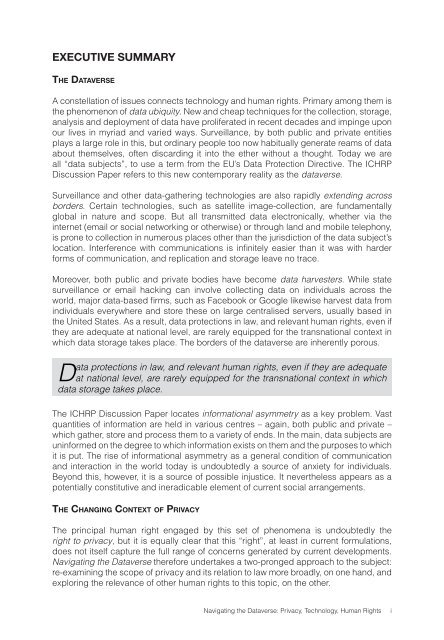Navigating the Dataverse: Privacy, Technology ... - The ICHRP
Navigating the Dataverse: Privacy, Technology ... - The ICHRP
Navigating the Dataverse: Privacy, Technology ... - The ICHRP
Create successful ePaper yourself
Turn your PDF publications into a flip-book with our unique Google optimized e-Paper software.
Executive Summary<br />
<strong>The</strong> <strong>Dataverse</strong><br />
A constellation of issues connects technology and human rights. Primary among <strong>the</strong>m is<br />
<strong>the</strong> phenomenon of data ubiquity. New and cheap techniques for <strong>the</strong> collection, storage,<br />
analysis and deployment of data have proliferated in recent decades and impinge upon<br />
our lives in myriad and varied ways. Surveillance, by both public and private entities<br />
plays a large role in this, but ordinary people too now habitually generate reams of data<br />
about <strong>the</strong>mselves, often discarding it into <strong>the</strong> e<strong>the</strong>r without a thought. Today we are<br />
all “data subjects”, to use a term from <strong>the</strong> EU’s Data Protection Directive. <strong>The</strong> <strong>ICHRP</strong><br />
Discussion Paper refers to this new contemporary reality as <strong>the</strong> dataverse.<br />
Surveillance and o<strong>the</strong>r data-ga<strong>the</strong>ring technologies are also rapidly extending across<br />
borders. Certain technologies, such as satellite image-collection, are fundamentally<br />
global in nature and scope. But all transmitted data electronically, whe<strong>the</strong>r via <strong>the</strong><br />
internet (email or social networking or o<strong>the</strong>rwise) or through land and mobile telephony,<br />
is prone to collection in numerous places o<strong>the</strong>r than <strong>the</strong> jurisdiction of <strong>the</strong> data subject’s<br />
location. Interference with communications is infinitely easier than it was with harder<br />
forms of communication, and replication and storage leave no trace.<br />
Moreover, both public and private bodies have become data harvesters. While state<br />
surveillance or email hacking can involve collecting data on individuals across <strong>the</strong><br />
world, major data-based firms, such as Facebook or Google likewise harvest data from<br />
individuals everywhere and store <strong>the</strong>se on large centralised servers, usually based in<br />
<strong>the</strong> United States. As a result, data protections in law, and relevant human rights, even if<br />
<strong>the</strong>y are adequate at national level, are rarely equipped for <strong>the</strong> transnational context in<br />
which data storage takes place. <strong>The</strong> borders of <strong>the</strong> dataverse are inherently porous.<br />
Data protections in law, and relevant human rights, even if <strong>the</strong>y are adequate<br />
at national level, are rarely equipped for <strong>the</strong> transnational context in which<br />
data storage takes place.<br />
<strong>The</strong> <strong>ICHRP</strong> Discussion Paper locates informational asymmetry as a key problem. Vast<br />
quantities of information are held in various centres – again, both public and private –<br />
which ga<strong>the</strong>r, store and process <strong>the</strong>m to a variety of ends. In <strong>the</strong> main, data subjects are<br />
uninformed on <strong>the</strong> degree to which information exists on <strong>the</strong>m and <strong>the</strong> purposes to which<br />
it is put. <strong>The</strong> rise of informational asymmetry as a general condition of communication<br />
and interaction in <strong>the</strong> world today is undoubtedly a source of anxiety for individuals.<br />
Beyond this, however, it is a source of possible injustice. It never<strong>the</strong>less appears as a<br />
potentially constitutive and ineradicable element of current social arrangements.<br />
<strong>The</strong> Changing Context of <strong>Privacy</strong><br />
<strong>The</strong> principal human right engaged by this set of phenomena is undoubtedly <strong>the</strong><br />
right to privacy, but it is equally clear that this “right”, at least in current formulations,<br />
does not itself capture <strong>the</strong> full range of concerns generated by current developments.<br />
<strong>Navigating</strong> <strong>the</strong> <strong>Dataverse</strong> <strong>the</strong>refore undertakes a two-pronged approach to <strong>the</strong> subject:<br />
re-examining <strong>the</strong> scope of privacy and its relation to law more broadly, on one hand, and<br />
exploring <strong>the</strong> relevance of o<strong>the</strong>r human rights to this topic, on <strong>the</strong> o<strong>the</strong>r.<br />
<strong>Navigating</strong> <strong>the</strong> <strong>Dataverse</strong>: <strong>Privacy</strong>, <strong>Technology</strong>, Human Rights
















